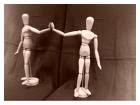 Lies are good. They aren't good per se, of course. But they are the secondary effect of something really important: your mind. Deceptive strategies are very common in nature. Plants and animals love to fool predators or preys; or better, they don't want to fool, they are just behaving as their behavioural program tells them. On the contrary, most sophisticated mammals, like cetaceans and apes, are capable of actual fooling or cheating. In other words they are able to start deceptive strategies by they own decision. A chimpanzee can behaving in front of a conspecific to make him believe he's believing something else. You can do this only if minds are playing. And you can be honest only if you can lie.
Lies are good. They aren't good per se, of course. But they are the secondary effect of something really important: your mind. Deceptive strategies are very common in nature. Plants and animals love to fool predators or preys; or better, they don't want to fool, they are just behaving as their behavioural program tells them. On the contrary, most sophisticated mammals, like cetaceans and apes, are capable of actual fooling or cheating. In other words they are able to start deceptive strategies by they own decision. A chimpanzee can behaving in front of a conspecific to make him believe he's believing something else. You can do this only if minds are playing. And you can be honest only if you can lie. Your access on the web is projecting yourself in to a new environment. Your face is not just your picture, it's the persons you talk to, your responses and also the people (or organizations, or the cluster of information) you are not talking to, you are avoiding. Your identity is not only a bar code that can be stolen or used improperly: it's your identity in the self consciousness sense. We are in the early stage of our Internet citizenship, but its presence is already there and the first we become aware of it, the best. The google failure with buzz brought me a sort of relief (I esteem and admire google; they are good and they improved our on-line life. Even too much, I personally becoming too reliant on google, it's becoming too present in my on-line experience. To some extent google could be identified with my on-line experience in general). The reason of relief was the patently invasion of privacy determined by the convergence. This exposed our intimate digital consciousness: it means first that we have one (good), second that someone stored it (less good).
Your access on the web is projecting yourself in to a new environment. Your face is not just your picture, it's the persons you talk to, your responses and also the people (or organizations, or the cluster of information) you are not talking to, you are avoiding. Your identity is not only a bar code that can be stolen or used improperly: it's your identity in the self consciousness sense. We are in the early stage of our Internet citizenship, but its presence is already there and the first we become aware of it, the best. The google failure with buzz brought me a sort of relief (I esteem and admire google; they are good and they improved our on-line life. Even too much, I personally becoming too reliant on google, it's becoming too present in my on-line experience. To some extent google could be identified with my on-line experience in general). The reason of relief was the patently invasion of privacy determined by the convergence. This exposed our intimate digital consciousness: it means first that we have one (good), second that someone stored it (less good).
 The possibility of being caught in illicit relationships in business, love and politics deployed an on-line ethics. It wasn't just the projection of our off line life in to digital relationship: you are not required to have met or said or done anything. The simple on-line relation stands as behaviour. And opens a stand alone moral environment, a space in which identities can play. It's a new ground, and it's gaining quickly importance. Probably you never spent too much time reflecting on yourself:your consciousness is often taken for granted, but I recommend some reflections on the digital one: it's still wild outside....
The possibility of being caught in illicit relationships in business, love and politics deployed an on-line ethics. It wasn't just the projection of our off line life in to digital relationship: you are not required to have met or said or done anything. The simple on-line relation stands as behaviour. And opens a stand alone moral environment, a space in which identities can play. It's a new ground, and it's gaining quickly importance. Probably you never spent too much time reflecting on yourself:your consciousness is often taken for granted, but I recommend some reflections on the digital one: it's still wild outside....
















